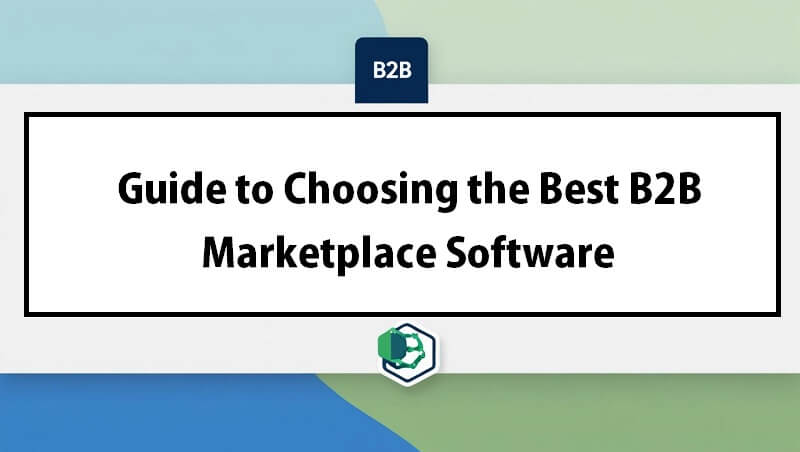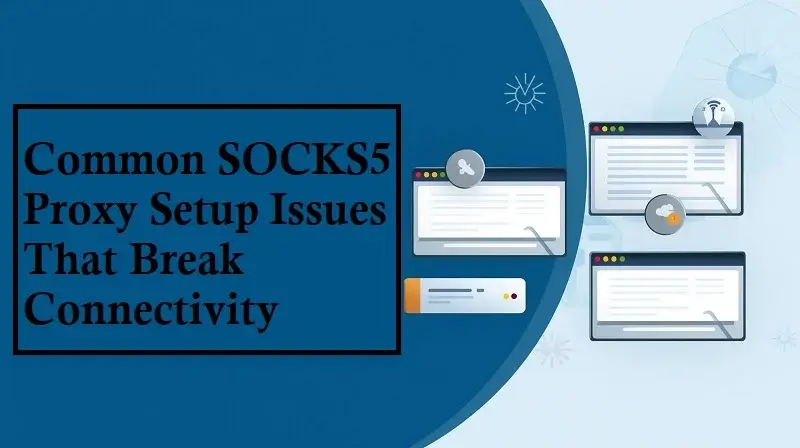The Ultimate Guide to Choosing the Best B2B Marketplace Software in 2025
in Technology on May 6, 2025The global B2B eCommerce market is on a steady rise. According to Research and Markets, the B2B market size was $19.34 trillion in 2024 and will grow at a CAGR of 16.17 to reach its new heights of $47.54 by 20230. The growth is driven by increased digital adoption, automation, and platform-based trade. In this evolving space, launching a B2B marketplace is no longer just an opportunity—it’s becoming a strategic necessity for wholesalers, manufacturers, and enterprise sellers.
However, building such a marketplace from scratch can be expensive and time-consuming. That’s where B2B marketplace software comes in. These ready-made solutions allow businesses to create fully functional multi-vendor marketplaces without the need to develop them from scratch.
In this guide, we’ll help you understand what a B2B marketplace platform is, why choosing the right one is crucial, which features to prioritize, and how to evaluate and select the best B2B marketplace software for your business.

What is a B2B Marketplace Software?
A B2B marketplace platform is a software solution that enables businesses to build online marketplaces where multiple vendors can list and sell products or services to other businesses. Unlike B2C platforms, B2B marketplaces focus on bulk orders, negotiated pricing, and have longer sales cycles.
Examples include platforms like Alibaba, Amazon Business, and Global Sources, which cater to a wide range of industries and facilitate features tailored to B2B transactions, such as RFQ (request for quotes), tiered pricing, and more.
Who Can Benefit from B2B Multi-Vendor Marketplace Software?
B2B multi-vendor marketplace software enables businesses to create platforms where multiple vendors can sell their products or services to other businesses. It offers powerful tools for managing vendors, handling bulk transactions, and streamlining B2B operations at scale. Here’s a breakdown of who can benefit the most from this software:
- Manufacturers
Manufacturers can join or launch multi-vendor marketplaces to sell directly to business buyers, expand their distribution reach, and manage product listings independently without relying solely on traditional supply chains. - Wholesalers and Distributors
These businesses can efficiently manage large inventories and bulk orders while reaching new buyers through a centralized multi-vendor platform that supports multiple pricing tiers and account types. - Professional Service Aggregators
Companies offering B2B services—like logistics, consulting, or IT support—can list multiple service providers, manage bookings, and offer bundled or specialized service packages in one place. - Niche Marketplace Owners
Entrepreneurs targeting specific industries (e.g., construction, medical supplies, fashion B2B, industrial equipment) can build curated marketplaces that bring together specialized vendors under one digital roof. - Retailers Expanding into B2B Wholesale
B2C retailers looking to tap into B2B markets can use multi-vendor functionality to onboard third-party wholesalers or suppliers, offering business buyers a wider range of products with bulk purchasing capabilities.
With B2B multi-vendor marketplace software, businesses can foster collaboration between suppliers and buyers, reduce operational overhead, and build scalable ecosystems tailored to industry-specific needs.
How to Choose the Right B2B Marketplace Software
Choosing the best multi-vendor marketplace platform is a crucial step in building a successful B2B marketplace. The right software will shape your entire business journey—from vendor onboarding to order management and scalability. In this guide, we’ll explore how to select the best solution to launch and grow your B2B multi-vendor marketplace
- Long-Term Scalability: The platform you choose should support your growth without requiring major rework or migration.
- Cost Efficiency: The wrong platform can lead to unnecessary spending on third-party integrations, development, and maintenance. Therefore, always choose a platform that is compatible with customizations, supports all the essential features, functionalities, tools, and more. This will help you avoid additional expenses that can occur to launching a fully functional B2B marketplace.
- Vendor and Buyer Experience: Intuitiveness is paramount for any marketplace. A seamless, intuitive interface builds trust and drives retention among users. Therefore, always choose a B2B marketplace software that is user-friendly and ensures seamless transition.
- Compliance and Security: B2B platforms handle sensitive data and large transactions, making security a top priority. Hence, consider solutions that meet all compliance and security requirements, supported by automated compliance software for streamlined enforcement.
- Competitive Edge: The right features can help you outpace competitors by offering a better user experience and more value.
Key Features to Look for in a B2B Marketplace Software
To find the best B2B marketplace software for your needs, ensure it offers the following core capabilities:
a. Bulk Ordering and Tiered Pricing
B2B buyers often purchase in large volumes. Your platform should support dynamic pricing, volume discounts, and minimum order quantities.
b. Request for Quote (RFQ) and Negotiation Tools
RFQ functionality allows buyers to request custom quotes from sellers, enabling negotiations, a must-have in the B2B industry. Robust RFP management features can also streamline proposal handling, making it easier for vendors and buyers to collaborate efficiently.
c. Multi-User Accounts and Role-Based Permissions
Businesses often operate through teams. Your platform should allow multiple users under one account with defined roles like procurement, finance, or admin.
d. Vendor Management System
Efficient onboarding, profile management, commission handling, and performance tracking are essential to manage sellers effectively. Integrating vendor management software into the marketplace enhances these processes by automating routine tasks, ensuring data consistency, and offering actionable insights that support strategic decision-making.
e. Payment Gateways with B2B Support
Look for flexible payment options like invoicing, bank transfers, credit lines, and part payment options tailored to B2B transactions. Using an invoice generator can streamline the invoicing process, ensuring accuracy and saving time, especially when dealing with multiple clients or recurring payments.
f. Integration Capabilities
Your platform should support integration with popular ERPs, CRMs, inventory systems, logistics APIs, and others.
g. SEO and Marketing Tools
Built-in SEO features, marketing automation, and email marketing support will help promote your marketplace organically.
h. Mobile Responsiveness
With increasing mobile usage, having a responsive design or dedicated app is a must.
FATbit’s Yo!Kart B2B is a good example of a platform that includes most of these features, which significantly reduces launch time and costs. You can launch and operate a fully functional B2B multi-vendor marketplace with Yo!Kart B2B
Critical Questions to Ask Before Selecting a B2B Marketplace Software
Choosing the right B2B marketplace software is a strategic business decision. Asking the right questions early on can save you time, money, and technical headaches in the long run. Here are the most important questions to evaluate, along with insights on what an ideal solution should offer:
- Does the platform support my specific business model and industry requirements?
The marketplace software you choose should be flexible enough to cater to your specific business model and industry needs. For instance, if you’re running a wholesale marketplace, look for features like bulk order management, tiered pricing, and the ability to handle large-scale transactions. The software should also align with industry standards, compliance requirements, and transaction types specific to your niche, whether it’s manufacturing, services, or retail.
- 2. How customizable is the solution in terms of design, features, and workflows?
A good B2B marketplace platform should allow you to customize the user interface, workflows, and features to fit your brand and operational needs. Customization options can include personalized vendor storefronts, custom pricing models, specific shipping and payment methods, and the ability to modify product categories. The more customizable the platform, the better you can align it with your business goals, improving both the user experience and operational efficiency.
- 3. Is the software scalable to accommodate growth in users, vendors, and transactions?
Scalability is a crucial factor when selecting B2B marketplace software. As your marketplace grows, your software should be able to accommodate an increasing number of vendors, buyers, and transactions without compromising performance. The platform should have the ability to handle larger catalogs, multiple payment gateways, increased traffic, and complex pricing models as your marketplace expands over time.
- 4. What level of third-party integration is supported (ERP, CRM, payment gateways)?
Integrating third-party tools such as ERP systems, CRM software, and payment gateways is critical for the seamless operation of your B2B marketplace. Make sure the platform allows for easy integrations with the tools your business is already using or plans to use in the future. Integration with popular tools ensures smoother operations, improves efficiency, and allows you to provide a better experience for both vendors and buyers.
- 5. What onboarding options are available for vendors and buyers?
Vendor and buyer onboarding can significantly impact the ease with which you can grow your marketplace. Look for software that offers intuitive onboarding processes, such as automated registration forms, easy-to-follow tutorials, and customizable onboarding workflows. This ensures that both vendors and buyers can quickly get started and use the platform without friction.
- 6. How robust are the analytics and reporting tools for tracking marketplace performance?
A strong analytics and reporting system is essential for monitoring the performance of your marketplace. Look for software that provides real-time data on key metrics such as user activity, sales performance, vendor success, and customer satisfaction. Customizable reports allow you to make data-driven decisions that will help improve your marketplace’s operations and identify new growth opportunities.
- 7. What security protocols are in place to protect business data and transactions?
Security is a top priority for any online marketplace, especially in the B2B sector. Ensure the software follows the latest security protocols to protect sensitive data, such as payment information and personal details. Features like data encryption, SSL certificates, two-factor authentication, payment passkeys, and secure payment gateways should be standard. Compliance with global data protection regulations (e.g., GDPR, CCPA) is also essential for ensuring the safety and privacy of your users.
- 8. Does the provider offer comprehensive customer support and ongoing software updates?
Customer support and regular software updates are important factors that should not be overlooked. Choose a software provider that provides dedicated customer support to resolve any issues quickly. Additionally, ongoing software updates ensure that your platform stays up-to-date with the latest features, security patches, and compliance standards. A reliable provider will continually improve the platform to meet evolving business needs and address any challenges that arise. An omnichannel contact center can further enhance support by unifying customer interactions across multiple channels, ensuring seamless communication and faster issue resolution.
How to Compare and Select the Best B2B Marketplace Software
Now that you know what to look for, here’s how to narrow down your options and pick the right solution.
a. Define Your Business Requirements
Define your business’s requirements. It will help you understand the kind of software you need, the features required, and many. Once you have finalized your requirements now you can easily decide and shortlist the type of solution that aligns with your business model.
b. Evaluate Feature Set vs. Customization
Some platforms come fully loaded but may be more challenging to customize. Others offer flexibility but require more development work. Choose the software based on your expertise and project timeline.
However, Yo!Kart B2B can be one of the best B2B marketplace software for you. It is a fully customizable and scalable solution and requires no technical expertise to operate your marketplace.
c. Consider Total Cost of Ownership
Don’t just look at the license or subscription cost. Focus on long-term costing. Subscription-based software is more expensive than a one-time pricing model.
d. Check for Community and Support
A strong user community, active forums, detailed documentation, and responsive technical support are essential, especially if you’re a non-technical founder.
e. Ask for a Demo or Free Trial
Most platforms offer demos or trial versions. Use this time to test key workflows like vendor onboarding, order processing, and checkout.
f. Read Reviews and Case Studies
Go through real user feedback and success stories. The FATbit blog on B2B eCommerce platforms includes detailed comparisons and insights to help guide your decision.
In-Depth Comparison of Leading B2B Marketplace Software for 2025
When selecting the best B2B marketplace software for 2025, it’s important to consider key features, scalability, ease of use, and customization options. Here’s a detailed comparison of the leading B2B marketplace solutions available this year, helping you make an informed decision:
Yo!Kart B2B
A comprehensive and feature-rich solution, Yo!Kart offers scalability, multi-vendor management, customizable storefronts, and advanced reporting features. You can also do code-level customization as the platform also provides source code ownership. Yo!Kart B2B excels in enabling B2B businesses to efficiently handle bulk orders, RFQs, and negotiations, and more through its B2B specific features and functionalities.
With Yo!Kart, you are assigned a dedicated project manager who guides you with all your queries and concerns associated with the solution. In addition, Yo!Kart B2B is available at a one-time payment option that helps save money from monthly or yearly recurring charges. In short, Yo!Kart B2B can be one of the best B2B marketplace software that lets you build, launch, operate, and grow your platform without the need for technical expertise and additional expenses.
CS-Cart B2B & B2C
A versatile platform catering to both B2B and B2C models. It provides flexibility in terms of product management, custom pricing, and multi-vendor management. While it’s user-friendly, the platform requires some technical expertise to fully unlock its potential for larger enterprises.
Magento with Extensions
Known for its robustness and scalability. However, it requires extensive customization, development effort, and technical expertise to make it work for B2B marketplaces. It can support complex workflows but may incur higher costs due to the development and ongoing maintenance requirements.
OroMarketplace
This enterprise-level platform offers a range of features for B2B marketplaces, including multi-vendor support, product catalogs, and backend integrations. However, its complexity and focus on large-scale enterprises make it a better fit for established businesses with high-volume transactions.
Mirakl
A premium, enterprise-grade solution designed for large-scale B2B marketplaces. While it offers excellent vendor management and advanced reporting tools, Mirakl is also known for its premium pricing, making it a significant investment for high-end B2B operations.
Why Choose Yo!Kart for Your B2B Marketplace in 2025?
Among these top contenders, Yo!Kart stands out as a comprehensive solution for entrepreneurs looking to launch a B2B marketplace in 2025. With its combination of affordability, scalability, and customization, Yo!Kart provides businesses with the tools they need to succeed in a competitive B2B environment. From seamless vendor management to customizable storefronts, it offers everything you need to build and grow a multi-vendor B2B marketplace.
Conclusion
Choosing the best B2B marketplace platform is a strategic decision that can make or break your digital commerce journey. The right platform can help you launch faster, scale smarter, and deliver a better experience to both vendors and buyers. By focusing on essential features, evaluating your needs carefully, and researching trusted providers, you can set your marketplace up for long-term success.
FAQs
Q1. What is a B2B marketplace platform?
A B2B marketplace platform allows multiple vendors, including manufacturers, distributors, and wholesalers, to sell goods or services to business buyers in one centralized online platform.
Q2. How is a B2B marketplace different from a B2C marketplace?
B2B platforms deal between businesses, supporting bulk orders, RFQs, tiered pricing, and longer buying cycles, while B2C platforms are designed for individual consumers with simpler purchase journeys.
Q3. Which is the best B2B marketplace platform in 2025?
Yo!Kart B2B can be one of the best B2B marketplace platforms for businesses looking for a self-hosted eCommerce platform.
Q4. How much does it cost to build a B2B marketplace using a platform?
Costs vary widely depending on the platform, customizations, and integrations, but using a white-label However, B2B marketplace software can significantly reduce development costs and time.
Q5. Can I start a B2B marketplace without technical knowledge?
Yes, many platforms are designed for non-technical founders and come with user-friendly admin panels, detailed documentation, and customer support. Yo!Kart B2B is also one of those platforms.








